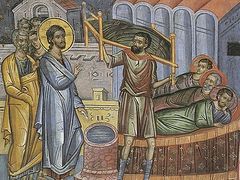In the name of the Father, and of the Son, and of the Holy Spirit!
Christ is Risen!
Dear brothers and sisters!
We are constantly asking God for something in one way or another, in various life situations. The sick pray for health, the poor ask not to starve to death, the suffering ask for happiness, sinners beg for forgiveness. But our petitions and entreaties aren’t always fulfilled, and so, with a certain amount of grumbling, resentment, and indignation, we often ask the priest in confession and our friends and relatives: “Why is God silent?” “Why doesn’t He hear my prayers?”
For many, God’s silence is a sign that He doesn’t exist. And if a man doesn’t receive what he asks for, then he stops praying altogether, falls into despondency, and renounces God. With such an understanding of faith, prayer is perceived as some kind of magic ritual: You read a prayer and immediately get what you’ve been seeking for such a long time. Unfortunately, even in prayer we seek some permanent benefit for ourselves: If we get what we ask, then we gladly thank and glorify God, but if we don’t, then we easily renounce Him.
Why is God silent? This is a question we’re used to asking everyone, not just ourselves. If God is silent, there are definite reasons for it. But what if it’s not about God, but about us? Maybe it’s we who are unable to listen to and hear Him? Of course, the Lord hears our prayers and ever speaks to us invisibly in the low whisper of love. But why is He in no rush to respond to our pleas?
First, in order to test our faith in terms of love and devotion to Him. The time that we wait for what we asked for is the most salutary time for the man who prays. It’s a kind of spiritual training in patience and prayer. Difficulties teach us to pray. God expects us not to rely on our own strength, but to give our entire life over into His hands. Fr. John (Krestiankin) said many times that nowhere did he pray so well as in prison. “It was in prison that I had true prayer,” he says. “And that’s because every day I was on the brink of death.” To learn to pray, we must go through the crucible of trials, and therefore difficulties are the motor that teaches us to pray. Once an elder was asked how he prospered in unceasing prayer, and he replied that he was taught by demons. His disciples asked in bewilderment: How could that be? And he replied that the demons tormented him so much that he was constantly in prayer, which turned prayer from a habit into an unceasing labor.
Second, we have to understand that God’s silence speaks for itself, for His answer is ever concealed in silence, namely: Either what we entreated is harmful and dangerous for us, or the time hasn’t yet come for what we entreated to bring the greatest benefit for our souls. Often when we ask for something, we do so out of ignorance, not understanding the full extent of the responsibility and difficulties that could immediately follow the fulfillment of our request. And sometimes it happens that we ask God for one thing and He gives another. For My thoughts are not your thoughts, neither are your ways My ways, saith the LORD (Is. 55:8). For example, someone asks God for their son or daughter to begin to correct themselves, to change, and God sends sickness to them or the parents, and then they truly begin to reflect, to repent.
Third, our petitions must be in accordance with God’s will (cf. 1 Jn. 5:14: And this is the confidence that we have in Him, that, if we ask any thing according to His will, He heareth us). Therefore, God will hear only that which is asked not for our benefit, but what is in accordance with His will. And how can we learn this will of God? The will of God for every man is revealed in the Gospel, hence: Everything that flows from the Gospel is God’s determination for us. Often, out of ignorance, we pray for things that are of no importance in the work of our spiritual salvation. St. Isaac the Syrian warns that we must be fearful of offending the greatness of God in prayer with requests for earthly things, because He Himself gives everything necessary for life according to His providence. Often, a man doesn’t get what he asked for because he asks not for the good or blessedness of his soul, but to use it for his desires (cf. Js. 4:3). Of course, a believer won’t ask for what is harmful for his soul, but even in asking God for great Christian virtues, it’s important to remember that they are given to a man not right away, but when he is most ready to accept God’s gifts. Therefore, it’s dangerous to receive God’s grace before the proper time, if we’re not first taught by experience and time.
Fourth, before complaining about God, that He’s hard-hearted and doesn’t hear our petitions, we have to make sure how well we hear God and are ready to live according to His Gospel commandments. How attentive and compassionate are we to the pleas of others, and especially to those unfortunate people who have fallen on hard times? Remember how indifferently we have passed by people who were suffering, begging for help, and we didn’t take their requests seriously, how indifferently we left these unfortunate people to die in the gutter, turning away from them, averting our eyes and covering our ears, considering such people a burden to society and dead to the world. After all this, do we have the right to hope that the Lord will hear us? And this blessed lesson from God is extremely important for us, for us to see ourselves. Before asking something from God, we must mourn our heart’s callousness towards others, and then hope to be heard.
Last Sunday was dedicated to the paralytic. He suffered a terrible illness for thirty-eight years. But he had no one willing to lend him a helping hand, to lower him into the pool, that he might be healed. This Gospel passage is very revealing, because, first of all, it demonstrates every man’s fixation with himself, and that can be characterized as egocentrism, clearly expressed in the unwillingness to leave our personal comfort zone for the good of another.
Remembering the paralytic, don’t despond when you think you’ve been abandoned by people, when you have no support of hope—God tests us to the last, but at the same time, He is always near and sees our podvig. And He comes when a man ceases to rely on himself and on the help of those who actually can’t help him. This is the real miracle for those who can wait patiently.
Our faith is primarily a living and active faith, filled with good deeds and aimed at helping others. A man must remain a man no matter what. There was a Greek philosopher, Diogenes. He allowed himself all sorts of eccentric antics in order to expose society’s vices. Then one sunny day, he went out to the central square with a lantern and began shouting: “I’m seeking a man, I’m seeking a man!” At this cry, the people came running, to which Diogenes said: “I called for people, not slaves!” But we are slaves to ourselves in many ways. We build a great idol out of our own “I,” sympathizing with it, cherishing it, making daily sacrifices, and denying ourselves nothing.
Let us remember that God always answers our prayers in one way or another, but not always as we want, and not always at the time we planned. God’s silence always teaches us something. Awaiting an answer from God is a question of patience, repentance, and personal prayer. Let us learn to wait for the Lord daily, for He is much nearer to us than we think. Let us reflect upon what we have done wrong, repent, and amend our ways, for Christ visits us daily in the depths of our hearts, if we abide in humble expectation.
Amen.









